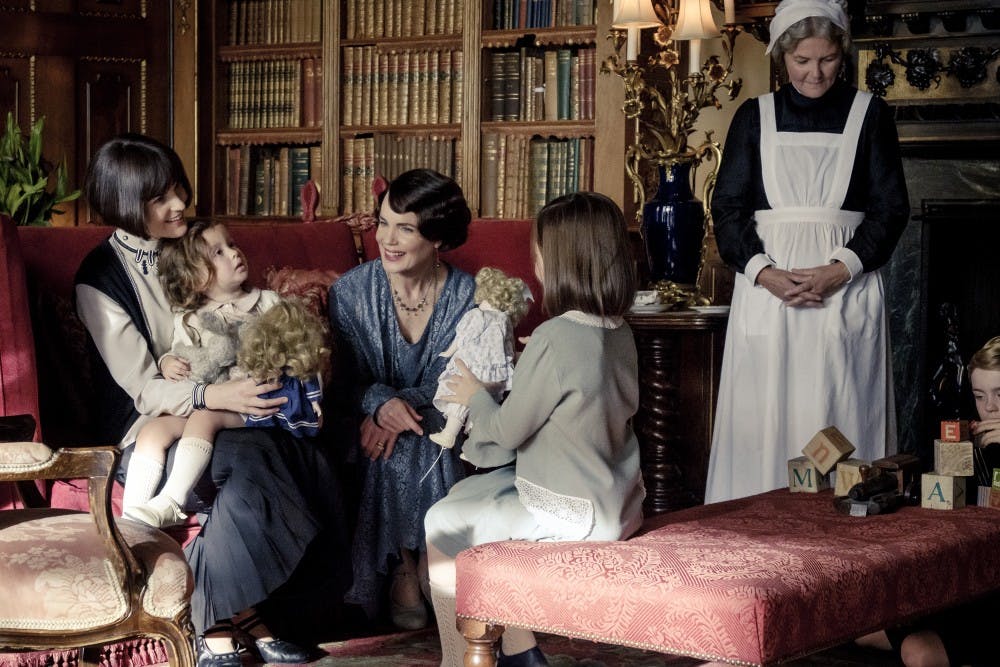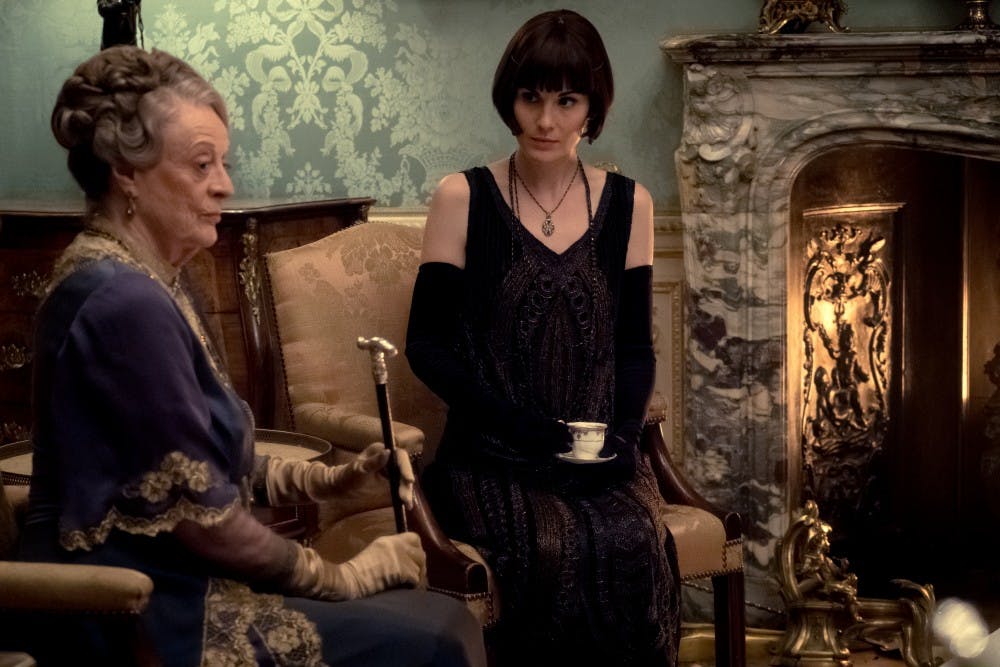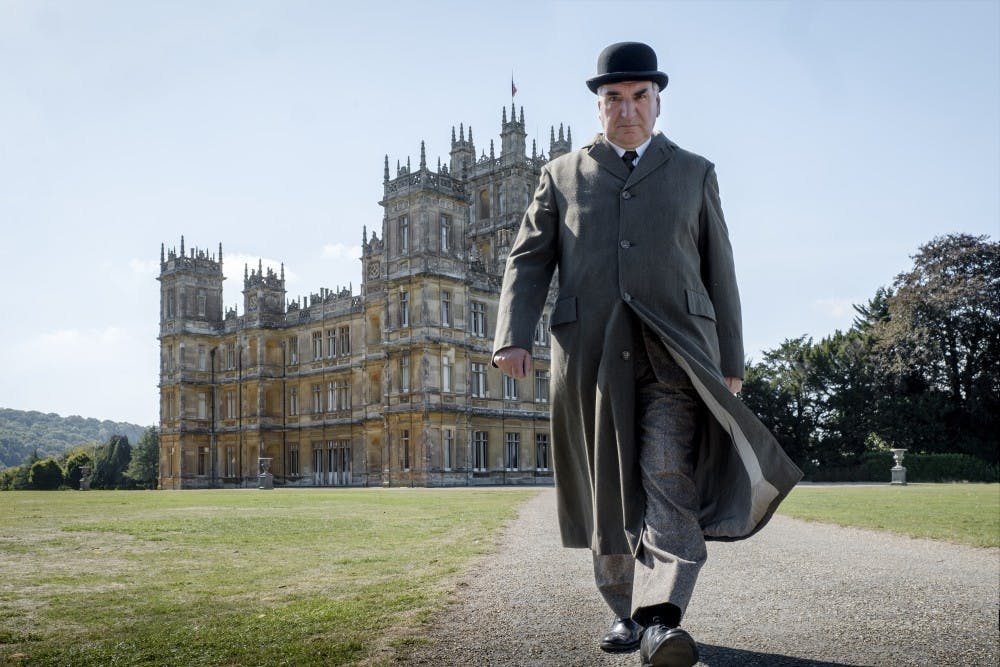Ring the service bells, polish the silver, and clean every surface until it “gleams and sparkles,” as Mrs. Carson would say—the Grantham family is back and the same as ever. And the same is completely fine. More than fine, in fact—it’s just right. Downton Abbey, the film, acts as the official conclusion to the identically–titled series that aired its sixth and final season on PBS in 2016. The transition from TV to the big screen is seamless, largely due to the fact that Julian Fellowes, the creator of the Emmy Award–winning series, is the film’s writer, and Michael Engler, who directed much of the series, serves as the film’s director.
It only takes a few seconds for the nostalgia to hit. The opening credits scene follows the journey of a letter from the King and Queen of England as it makes its way to Downton Abbey. As the letter's final “t” is crossed and “i” is dotted, Downton Abbey's classic eerie, urgent opening theme plays, ending when we get our first glimpse of the Crawley family's Jacobethan home where the story primarily unfolds. For a superfan of the show like myself, this introduction elicits goosebumps. For someone who isn’t familiar with the show, like the couple sitting a row ahead of me, you’re likely asking yourself if you walked into the wrong theatre—the film picks up right where the television show left off, with no formal introductions to the characters or their complex relationships.
After six seasons and over 40 hours of character development, the 122—minute film has to budget time, especially since Fellowes adds so many new storylines. And with the time crunch, only some characters get the same attention as they did in the series. Mr. Carson (Jim Carter), Lady Mary (Michelle Dockery), The Dowager Countess (Maggie Smith), and Mrs. Bates (Joanne Froggatt) take central roles as they did in the show. Cora Crawley (Elizabeth McGovern) and Mr. Bates (Brendan Coyle), however, fade into obscurity. While I never was a fan of Cora's drawl or Bates's reserved stares, their relative unimportance is an awkward choice, especially after Mr. Bates and his past contributed to some of the main plot lines of multiple seasons of the show.
When the letter finally arrives, Lord Grantham (Hugh Bonneville) opens it and announces that the "King and Queen are coming to stay at Downton." The news sends the family, along with the wait staff downstairs, into a tizzy. Such a tizzy, in fact, that Lady Mary seeks the help of Mr. Carson, who recently retired as the butler of Downton, to take over in the days leading up to and during the visit. When he obliges, longtime antagonist–turned–butler Thomas Barrow (Robert James–Collier) falls right back into his ways. However, it’s quickly apparent that neither Mr. Carson's nor Mr. Barrow’s services are necessary, as the King and Queen have a policy for their visits, and send their personal staff ahead to prepare and run the homes where they stay.
Not willing to let the chance to serve the royal family fly by, Mrs. Bates organizes a retaliation, featuring the impersonation of a British official and the addition of some "sleeping juice" to the royal chef's drink. This allows Downton’s staff to wait on the royals as they had so desired. While it's a rather absurd turn of events, it plays its role in the story that Fellowes is telling—the Downton family is not just those related by blood, but one that encompasses the wait staff, cooks, and servants too. This collection of characters is what makes Downton, Downton.

Credit : Jaap Buitendijk / © 2019 Focus Features, LLC
But in keeping with Downton style, this one plot is not enough. There are over a dozen other storylines that come and go over the two hours, including but not limited to: an assassination attempt on the King, Thomas getting arrested at an underground gay club, and an inheritance scandal involving one of the King's staff, Lord Grantham, and, of course, the perfectly prudent Dowager. For someone not familiar with Downton, a lot happens, and it all happens very, very quickly. Even for an avid fan, the plots in the film can become convoluted—they move much faster and without the degree of closure that they did in the show.
But even with all the storylines and, at times, their rather curt endings, Fellowes manages the moving parts nearly effortlessly. Most importantly, he provides fans with something they have been craving since the camera’s last pan in 2016—an ending.
Downton Abbey's series finale lacked the closure a show of its magnitude deserves. The episode featured monumental, shocking moments (including a marriage, a baby, and a promotion) that any true series finale should contain, but the story still felt unfinished. The final shot of the family singing "Auld Lang Syne" as they ring in the new year felt passé. It left Downton's great doors open for more.

This is where the film shines.
The movie only contains an hour and 40 minutes of story, as the last 20 minutes are set aside for each character's final line: their goodbye. While each one is perfectly executed, one still sticks out above the rest. The moment between the Dowager Countess and Lady Mary, inarguably the show's two leading ladies, strikes a new chord even after all six seasons of the show. The Dowager, who's always been known for her sarcastic zingers, tells Mary that she's dying and doesn't have long to live. While Mary begins protesting, the Dowager, calm as ever, delivers her final line by saying, "I’m leaving the family and the place that I treasure in talented hands" and telling Mary that she's the "future of Downton." This line marks the end of a generation at Downton and the end of the Downton story for the viewer. All that's left to do is lock Downton's great doors, something we see Mr. and Mrs. Carson do as the camera pans away one final time.
There's nothing groundbreaking or headline–making about the film, but it's the heartfelt conclusion Downton Abbey fans needed and deserved. Whereas the finale of Downton’s sixth television season felt like an informal "see ya later," the film Downton Abbey is a proper "farewell."

